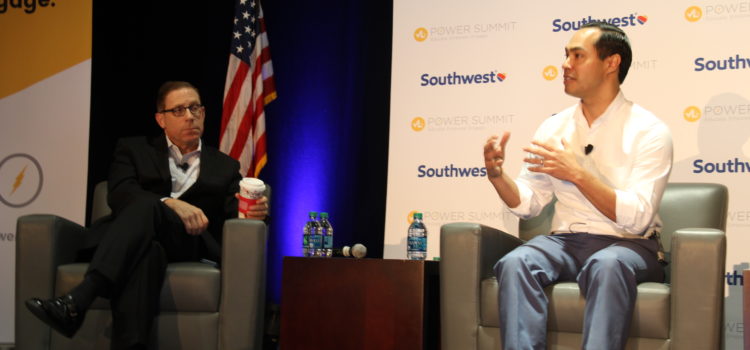
South Kern Sol, Veronica Morley
Photo above: Evan Smith of the Texas Tribune and Julian Castro (left to right)
I recently journeyed to the Voto Latino Power Summit 2017 in Austin, Texas to receive training and hear Latino leaders talk about the power of the Latino community in relation to current issues, including the state of DACA in Kern County and the U.S., and how the Latino youth must further mobilize to help create change in upcoming elections.
Along with two South Kern Sol youth reporters and Executive Director, Reyna Olaguez, we joined more than 500 emerging youth leaders in media, technology and advocacy for the two-day conference. Speakers included Voto Latino President and CEO María Teresa Kumar, Jehmu Greene from Fox News, University of Texas Political Scientist Dr. Victoria DeFrancesco Soto, Mickey Ibarra of the Latino Leadership Network, and former Secretary of Housing and Urban Development Julián Castro.
In one of the conference’s many talks, Evan Smith of the Texas Tribune moderated questions with Julián Castro about the tumultuous state of DACA in Kern County. He addressed the need for new legislation as well as current difficulties with law enforcement.
“That’s why it’s so important that Congress act to pass a Clean Dream bill,” Castro said, “because what the president has done rescinding DACA has left so many people in limbo, not knowing where the boundaries are, and whether they’re going to be subject to deportation today, tomorrow or when.”
He expressed his sympathies for Kern County DACA students who are feeling anxious about their status. Kern County Sheriff Donny Youngblood has made multiple efforts to undermine the California Trust Act and avoid sanctuary status for any Kern County cities. In April, Youngblood moved before the Kern County Board of Supervisors to adopt a resolution making Kern a “law and order” county, effectively ensuring that county law enforcement cooperate with U.S. Immigration and Customs Enforcement officers.
“The posture of a local sheriff’s department or police department might determine whether they [immigrants] actually get deported or not, regardless of what the federal priorities are,” Castro said. “They [immigrants] shouldn’t have to rely on that on chance. We need to pass in this country a Clean Dream Act to protect them. The support is there nationally to do it.”
Castro advised that Dreamers get involved in local and community politics. He said communities must raise their voices, and to utilize the power of elected officials to get their stories heard. “The stronger their voices are, the more they tell those stories, the more support that they’re going to get,” he said.
María Teresa Kumar, current President and CEO of Voto Latino addressed attendees about mobilizing the vote along with problems of divisiveness under the Trump Administration. “Once you are in the White House,” she said, “you don’t have a constituency except the American people.”
Kumar believes the next three years will be vital for the Latino community. At least 60 percent of U.S. Latinos are under the age of 33, with a mean age of 16-17 years. Kumar encourages all Latino youth, whether they are old enough to vote or not, to start preparing for elections. She hopes that today’s youth will register to vote when they can, or if they are undocumented, that they will reach out to those around them to register and vote for the Latino community.
She reminded the attendees that Voto Latino, a non-profit, non-partisan civic media organization headquartered in Washington, D.C. has many tools and tips available to the community about voting and elections. “We really try to arm you with information,” said Kumar.
Wilmer Valderrama, also a member of Voto Latino, spoke about his experience as an immigrant-actor making it in Hollywood.
“The biggest gift I had was being naive, was being innocent to the fact that there are certain realities in this country that have held back minorities,” said Valderrama. He came to the United States when he was sixteen years old and couldn’t speak English. By the time he turned eighteen, he’d taught himself English and became the only Latino actor on Fox Network with a main role. He played Fez on “That ’70s Show.”
Voto Latino started with nine chapters in 2004. It now has 24 college chapters and two high school chapters harnessing the power of civic engagement.
“The number one reason that Latinos do not get involved in politics, and the number one reason why they don’t vote, is because they say, ‘No one asked me,’” said Kumar who joined the organization when she was twenty-nine years old because she felt no one was talking to her about issues of Latinos voting.
The Voto Latino Power Summit 2017 is part of the organization’s “When They Go Low, We Go Local” campaign. According to the Voto Latino website, “only 1 in 5 eligible voters cast ballots in mayoral elections where constituents have the most to gain—and the most to lose . . . We need continued civic engagement in municipal and local elections in order to build for the 2018 midterm elections and beyond.”
Veronica Morley, 21, is a student at Cal State Bakersfield majoring in journalism and a youth reporter for South Kern Sol.